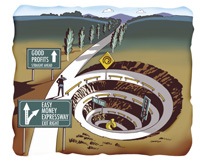Difference between revisions of "Profit"
(Created page with 'File:lighterstill.jpgright|frame ==Etymology== [http://nordan.daynal.org/wiki/index.php?title=English#ca._1100-1500_.09THE_MIDDLE_ENGLISH_PERIOD Middle E...') |
|||
| Line 10: | Line 10: | ||
*4 : the [[ratio]] of profit for a given year to the amount of capital invested or to the [[value]] of sales | *4 : the [[ratio]] of profit for a given year to the amount of capital invested or to the [[value]] of sales | ||
*5 : the compensation accruing to entrepreneurs for the [[assumption]] of risk in [[business]] enterprise as distinguished from wages or rent | *5 : the compensation accruing to entrepreneurs for the [[assumption]] of risk in [[business]] enterprise as distinguished from wages or rent | ||
| + | |||
| + | ---- | ||
| + | |||
| + | <center>For lessons on the [[topic]] of '''''Profit''''', follow [http://nordan.daynal.org/wiki/index.php?title=Category:Profit '''''this link'''''].</center> | ||
| + | |||
==Description== | ==Description== | ||
In [http://en.wikipedia.org/wiki/Neoclassical_economics neoclassical economics], economic '''profit''', or profit, is the [[difference]] between a firm's total revenue and its opportunity costs. In [http://en.wikipedia.org/wiki/Classical_economics classical economics] profit is the return to the employer of capital stock (machinery, factory, a plow) in any productive pursuit involving [[Work|labor]]. These two definitions are actually the same. In both instances economic profit is the return to an [http://en.wikipedia.org/wiki/Entrepreneur entrepreneur] or a group of entrepreneurs. Economic profit is thus contrasted with economic [http://en.wikipedia.org/wiki/Interest interest] which is the return to an owner of capital stock or [[money]] or bonds. In finance or accounting, profit is the increase in monetary [[wealth]] that an investor realizes from making an investment, taking into consideration all costs [[associated]] with that investment including the opportunity cost associated with other monetary investments.[http://en.wikipedia.org/wiki/Profit_(economics)] | In [http://en.wikipedia.org/wiki/Neoclassical_economics neoclassical economics], economic '''profit''', or profit, is the [[difference]] between a firm's total revenue and its opportunity costs. In [http://en.wikipedia.org/wiki/Classical_economics classical economics] profit is the return to the employer of capital stock (machinery, factory, a plow) in any productive pursuit involving [[Work|labor]]. These two definitions are actually the same. In both instances economic profit is the return to an [http://en.wikipedia.org/wiki/Entrepreneur entrepreneur] or a group of entrepreneurs. Economic profit is thus contrasted with economic [http://en.wikipedia.org/wiki/Interest interest] which is the return to an owner of capital stock or [[money]] or bonds. In finance or accounting, profit is the increase in monetary [[wealth]] that an investor realizes from making an investment, taking into consideration all costs [[associated]] with that investment including the opportunity cost associated with other monetary investments.[http://en.wikipedia.org/wiki/Profit_(economics)] | ||
[[Category: Economics]] | [[Category: Economics]] | ||
Revision as of 01:08, 19 November 2011
Etymology
Middle English, from Anglo-French, from Latin profectus advance, profit, from proficere
- Date: 14th century
Definitions
- 1 : a valuable return : gain
- 2 : the excess of returns over expenditure in a transaction or series of transactions; especially : the excess of the selling price of goods over their cost
- 3 : net income usually for a given period of time
- 4 : the ratio of profit for a given year to the amount of capital invested or to the value of sales
- 5 : the compensation accruing to entrepreneurs for the assumption of risk in business enterprise as distinguished from wages or rent
Description
In neoclassical economics, economic profit, or profit, is the difference between a firm's total revenue and its opportunity costs. In classical economics profit is the return to the employer of capital stock (machinery, factory, a plow) in any productive pursuit involving labor. These two definitions are actually the same. In both instances economic profit is the return to an entrepreneur or a group of entrepreneurs. Economic profit is thus contrasted with economic interest which is the return to an owner of capital stock or money or bonds. In finance or accounting, profit is the increase in monetary wealth that an investor realizes from making an investment, taking into consideration all costs associated with that investment including the opportunity cost associated with other monetary investments.[1]
